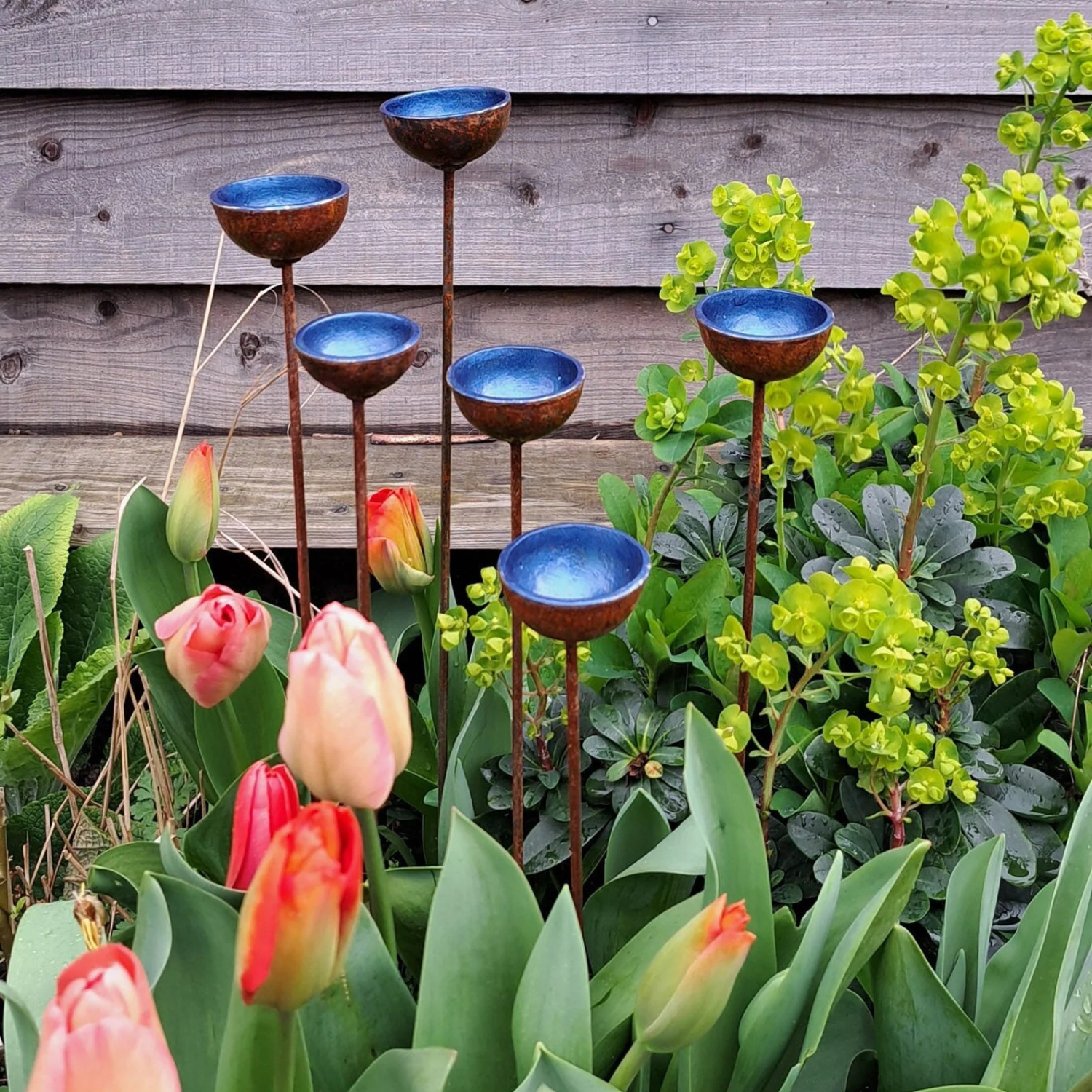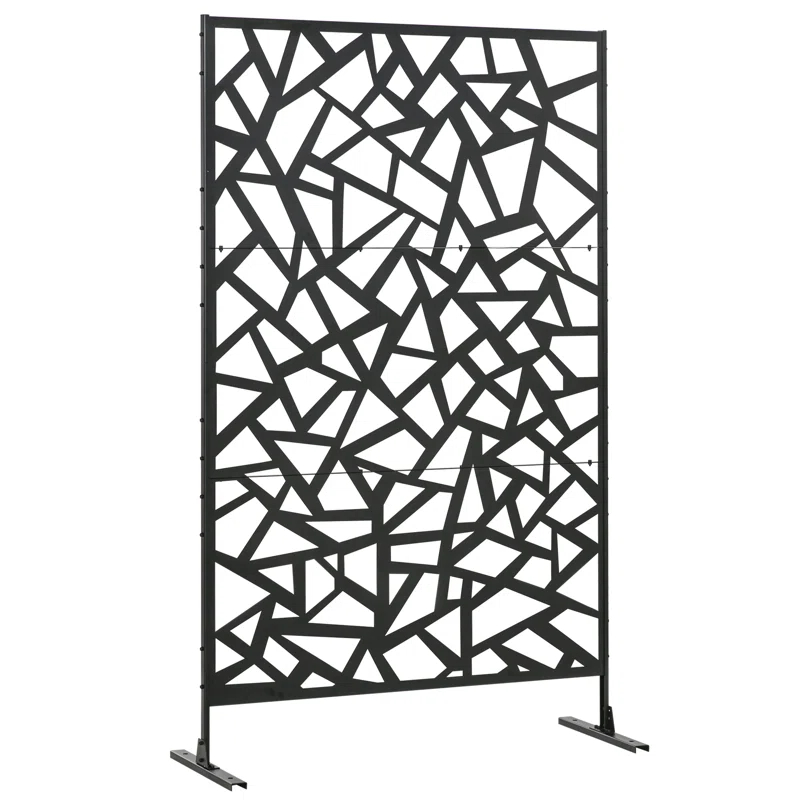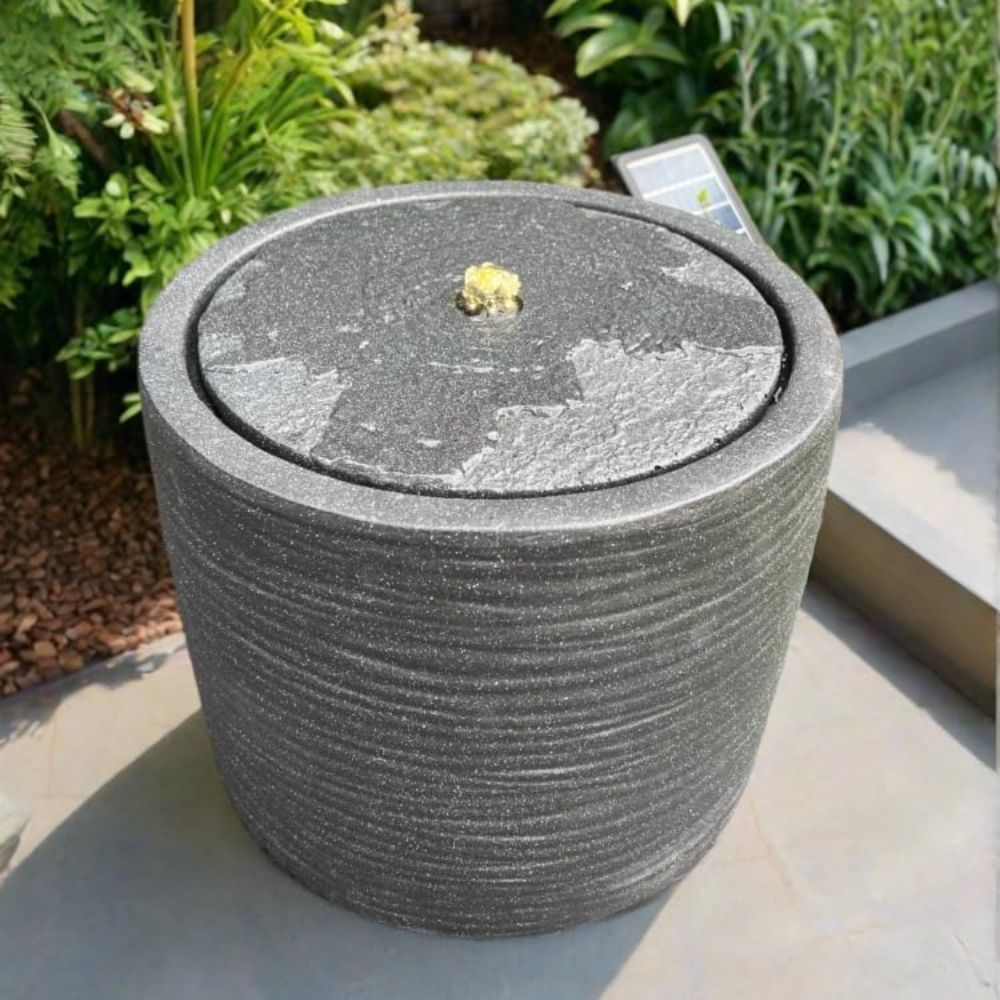Sensory garden ideas – 17 ways to create a gorgeous space that appeals to all the senses
Putting together a sensory garden should be an absolute pleasure

Ellis Cochrane
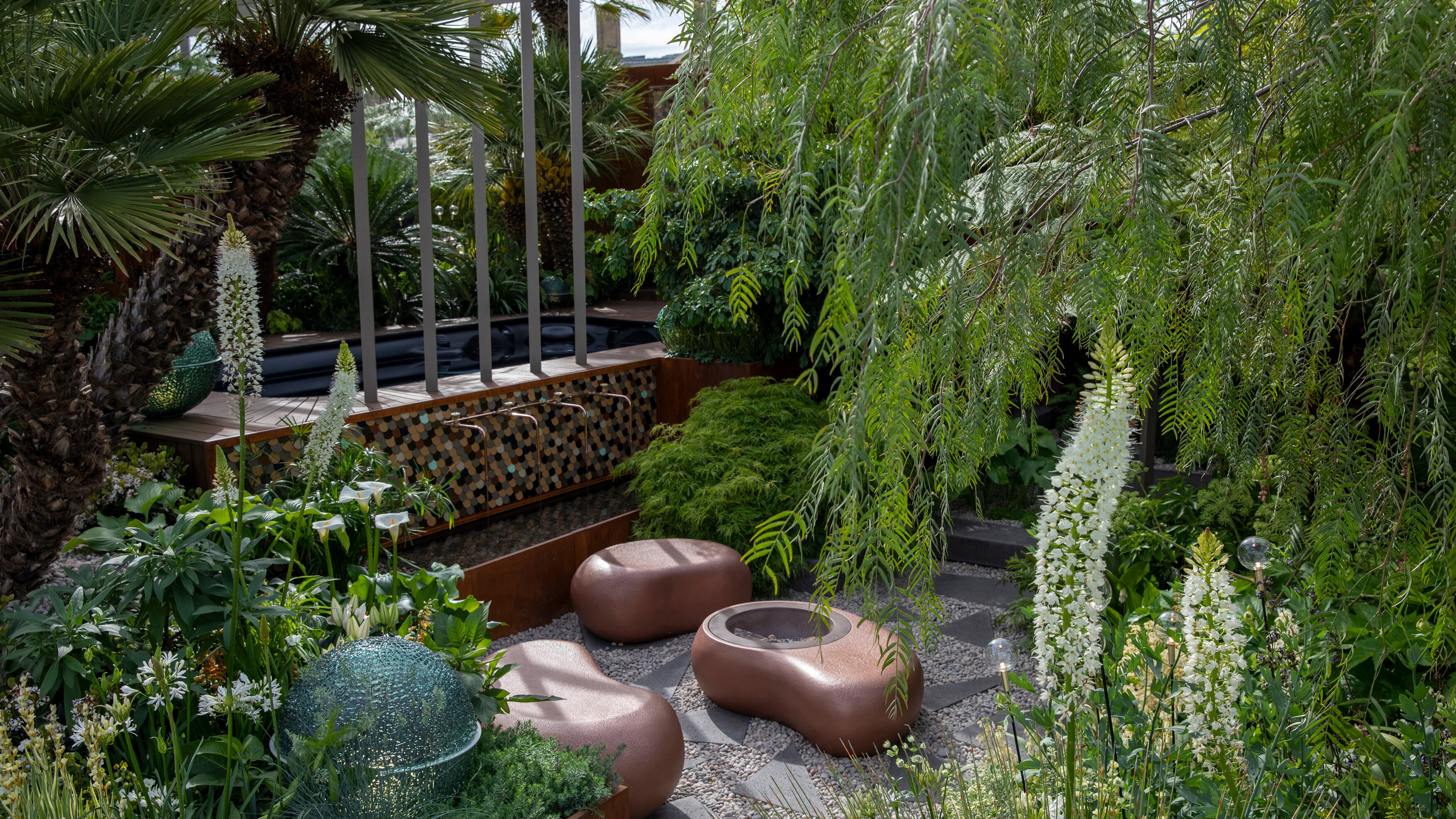
Sign up to our newsletter for style inspiration, real homes, project and garden advice and shopping know-how
You are now subscribed
Your newsletter sign-up was successful
EDITOR’S NOTE: An earlier version of this article included a quote from a purported expert whose credentials we have not been able to verify. The quote has been removed. We regret this lapse in our verification process and have updated our internal protocols to reduce the risk of recurrence.
Without even realising it, our gardens and outdoor spaces can have a number of different sights, sounds, textures, tastes and scents. Just think about the wonderful colours and shapes you might see, the sounds of birdsong and the crunch that occurs as you walk over gravel or stones and all the beautiful scents that you might be able to smell.
But if you’re thinking about designing your very own sensory garden, you need to consider how your garden ideas will stimulate each of your five senses as you enjoy time outside.
'The more senses we engage, the richer the experience and the more we remember of our experience in a garden,' adds. Claire Francis, spokesperson for Sensory Trust. 'With imaginative sensory design and sensitive attention to detail, a garden becomes a sensory feast.'
So, if you’re considering how to plan a garden with sensory elements, there are plenty of great ways to create a bespoke space which will engage and invigorate anyone who pays it a visit.
1. Bring in the light
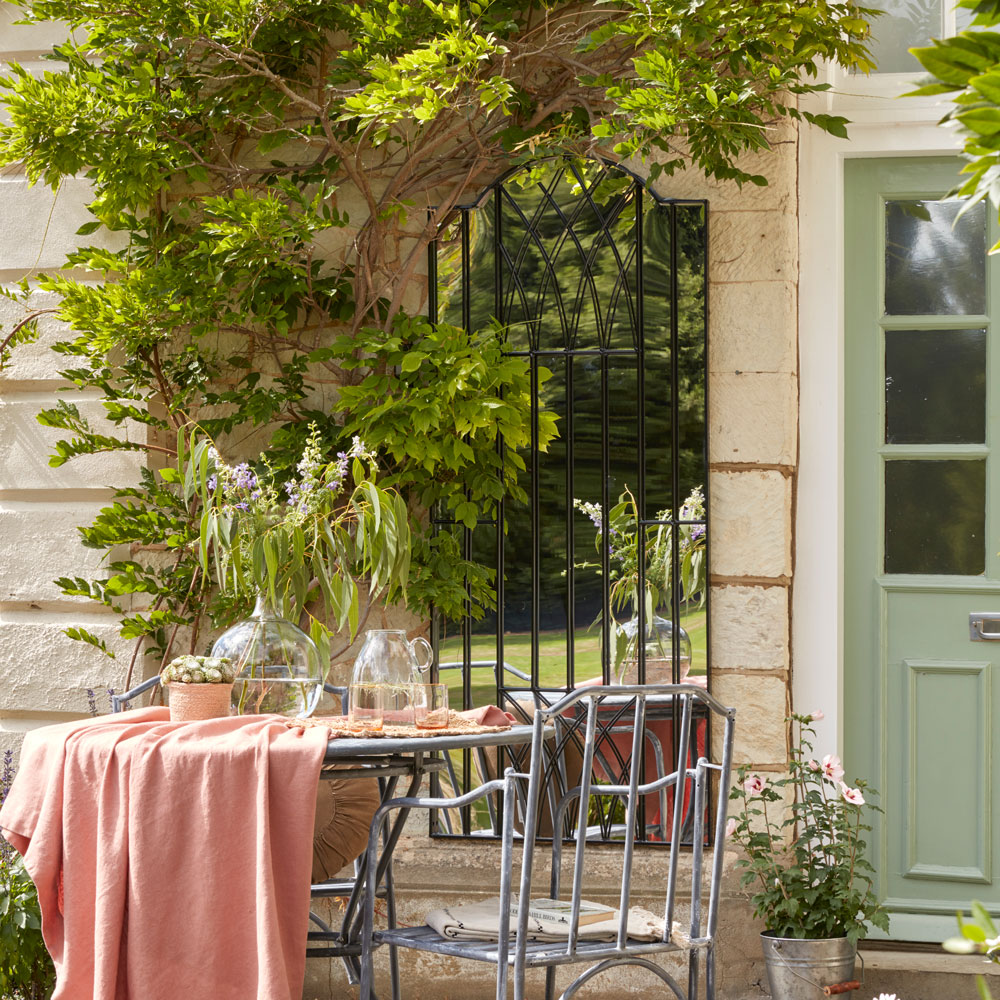
In a sensory garden, you will want to create areas of light and shade, but especially if you’re looking for north-facing garden ideas you will want to maximise natural light where it’s needed.
Natural light lifts the spirits and makes even the most compact outdoor space feel airier. Fixing up a garden mirror will perform the trick of effectively doubling the available light. Always take care never to place reflective surfaces in hot sun (due to fire risk), or where birds can fly into them and become injured.
2. Put scent front and centre
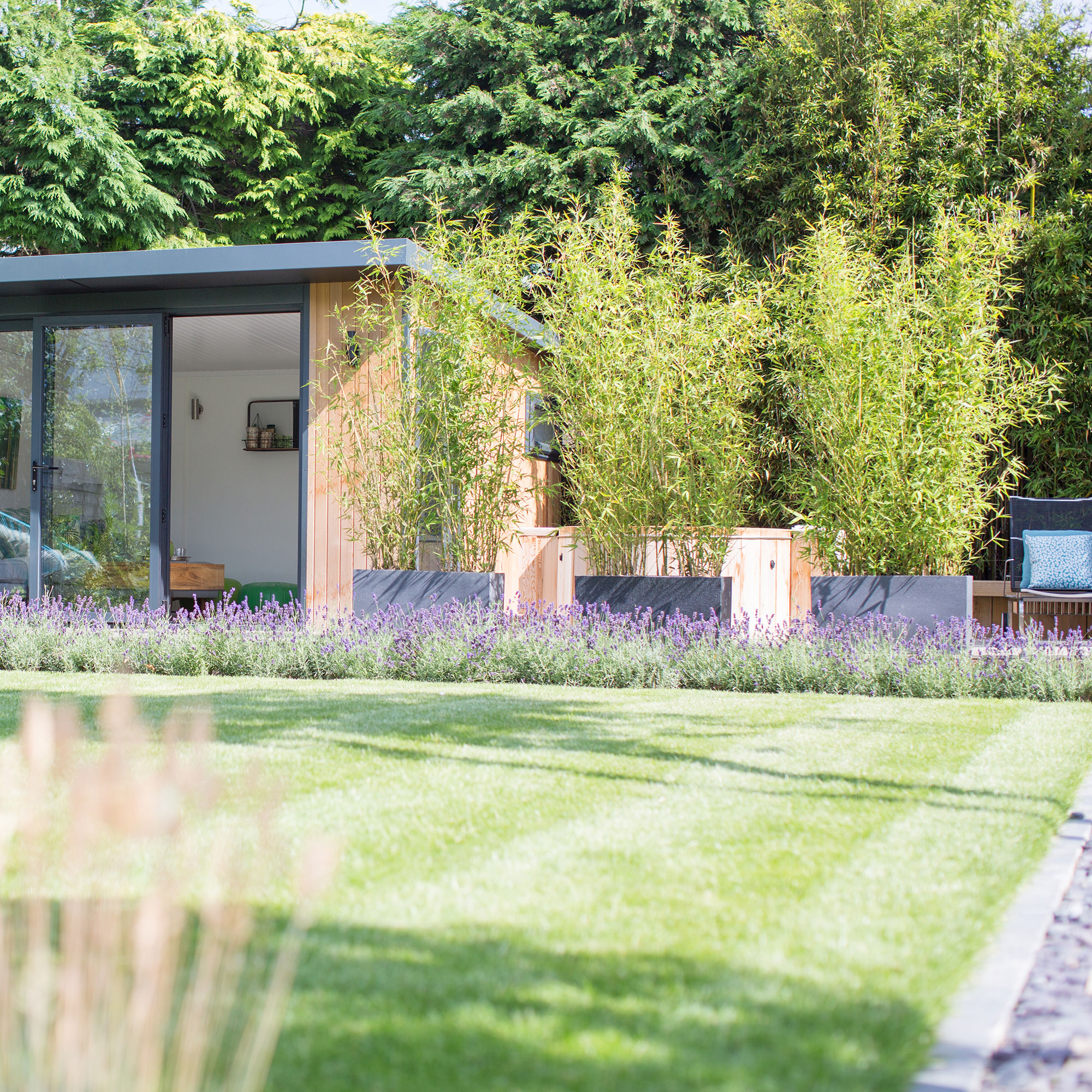
Flowers in sensory gardens should do double duty; colour and shape, plus fragrance, says Rob Grayson, head of purchasing at Hillier Garden Centres: 'With careful plant selection any garden can be a treat for all the senses. There is a great pleasure to be had from a beautifully-scented garden; whether that is the fragrant waft as you run your hands through lavender, or the sweet scent of hamamelis brightening the winter garden. There are a large number of scented plants to select from all year around.'
Sign up to our newsletter for style inspiration, real homes, project and garden advice and shopping know-how
Rob recommends placing scented plants along a path, in pots near doors, or as part of creating a perfumed border. You should also consider scented varieties when looking at easy climbing plant ideas which will wrap around your sensory garden beautifully.
3. Play around with colour
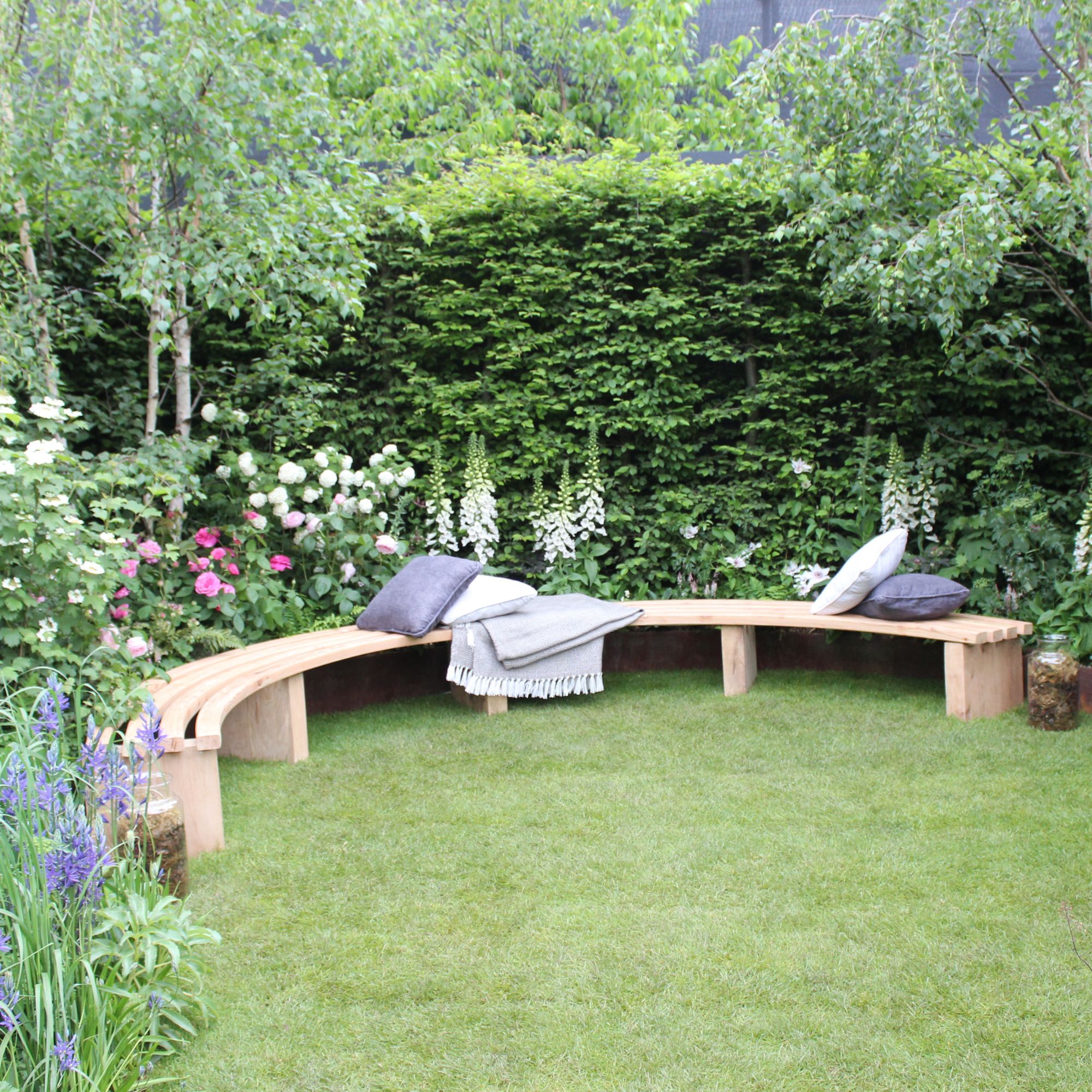
Colourful flowers and fauna can also stimulate our sense of sight. In fact, in most cases, our sight is the first sense which is engaged when we walk into a garden.
Colour isn’t just limited to the plants and blooms, it can also be applied with colourful pieces of garden furniture and hardscaping too.
4. Enjoy those natural sounds
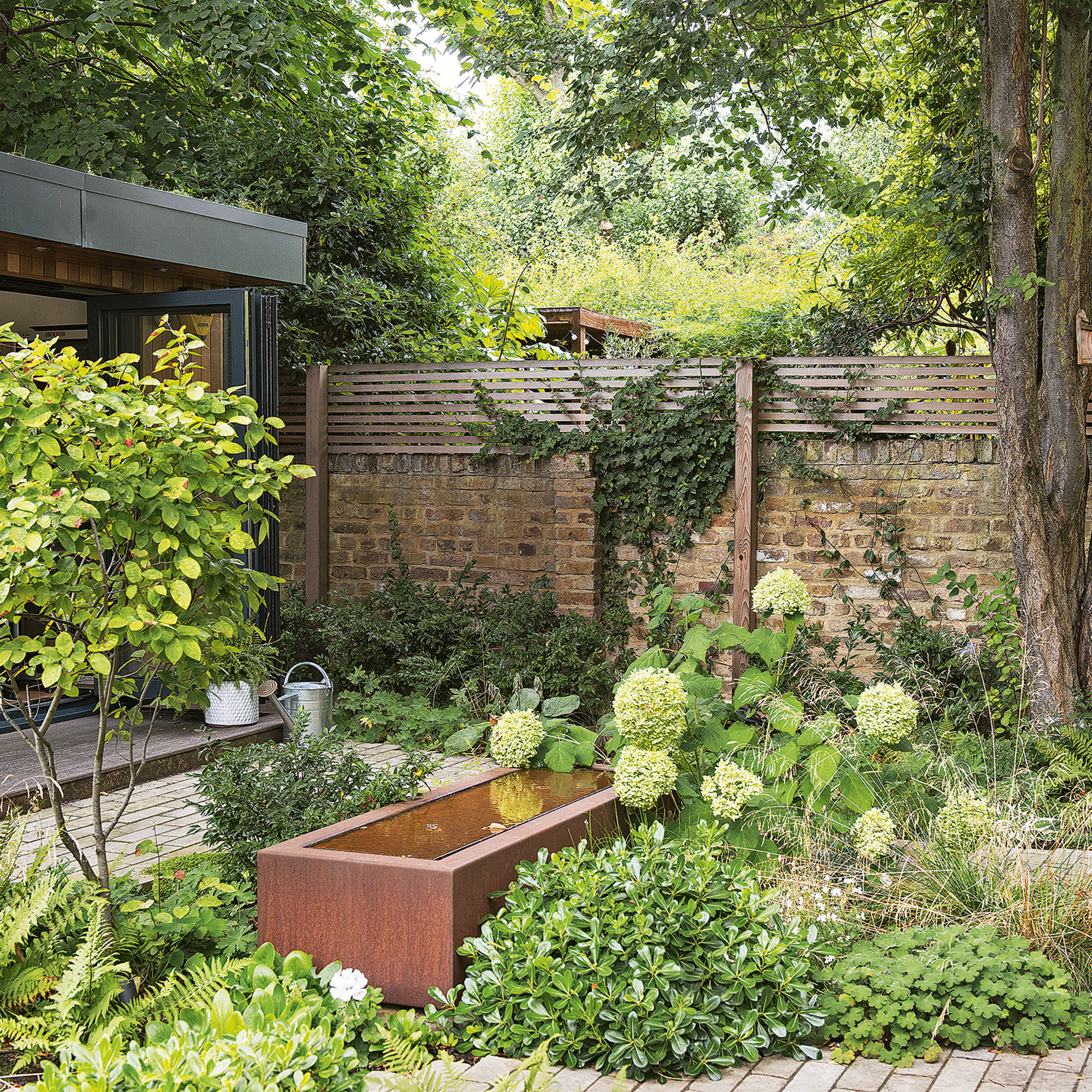
Whether it’s the gentle tinkle of a water feature idea – a simple solar-powered model will do the trick – grasses waving in the gentle breeze, delicate wind chimes, cheerful birdsong or a busily buzzing pollinator going about its business, natural sound is crucial in a sensory garden. Include plants that quietly rustle when the wind passes through them, such as bamboo stems and seedpods.
To create a living dimension to those sensory garden sounds, encourage busy wildlife by planting attractive plants creatures can nibble on and hanging bird feeders, insect houses and bee hotels.
5. Think about how to enjoy the space in the evening
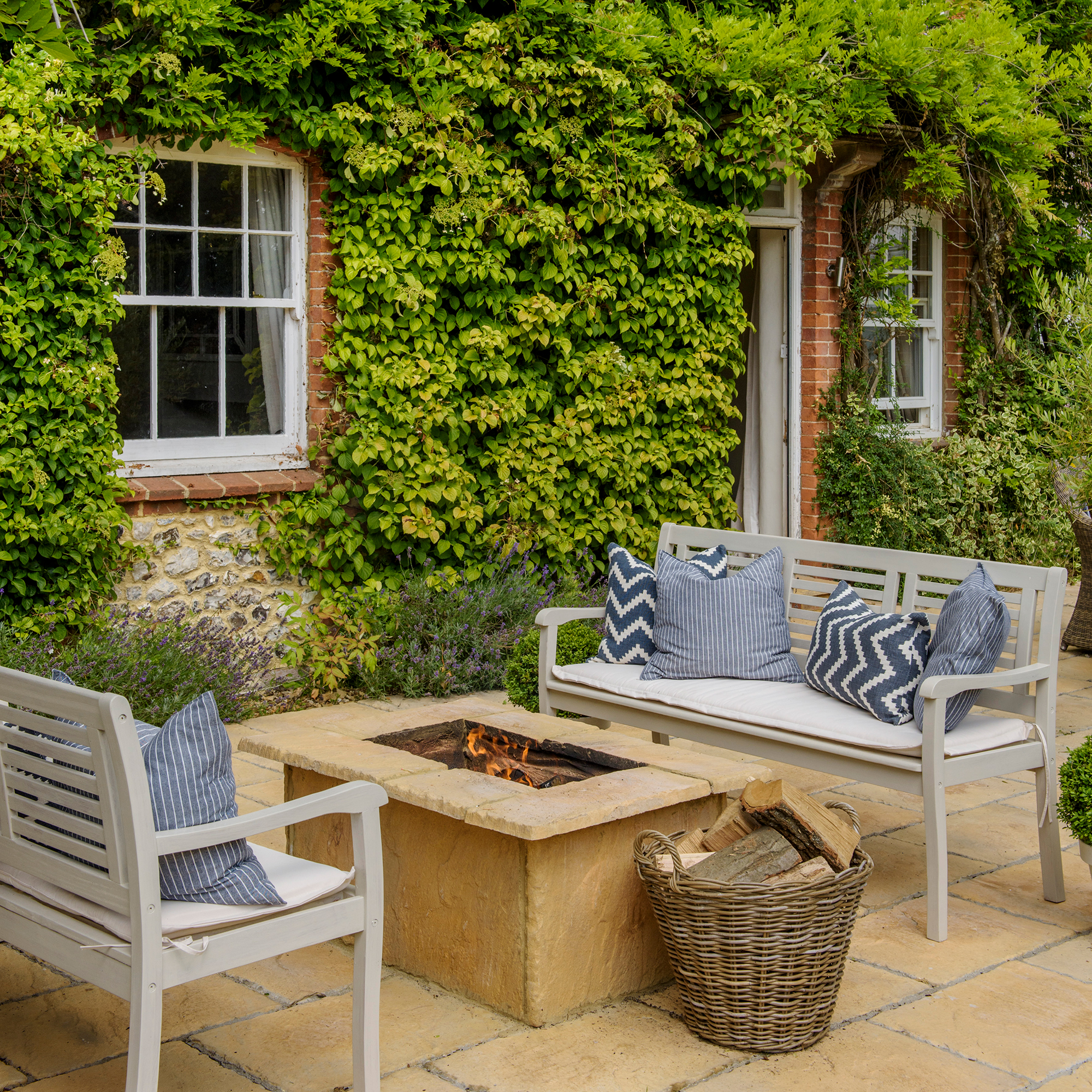
We probably don’t think twice about sitting out in the garden during the day but it’s just as pleasant and relaxing, particularly if the weather allows, to sit out in the evening. So, it’s important to install some elements which truly come into their own as the sun starts to set.
When it comes to the best night-scented plants, there are plenty to choose from to create your very own nighttime retreat.
6. Add a touch of comfort
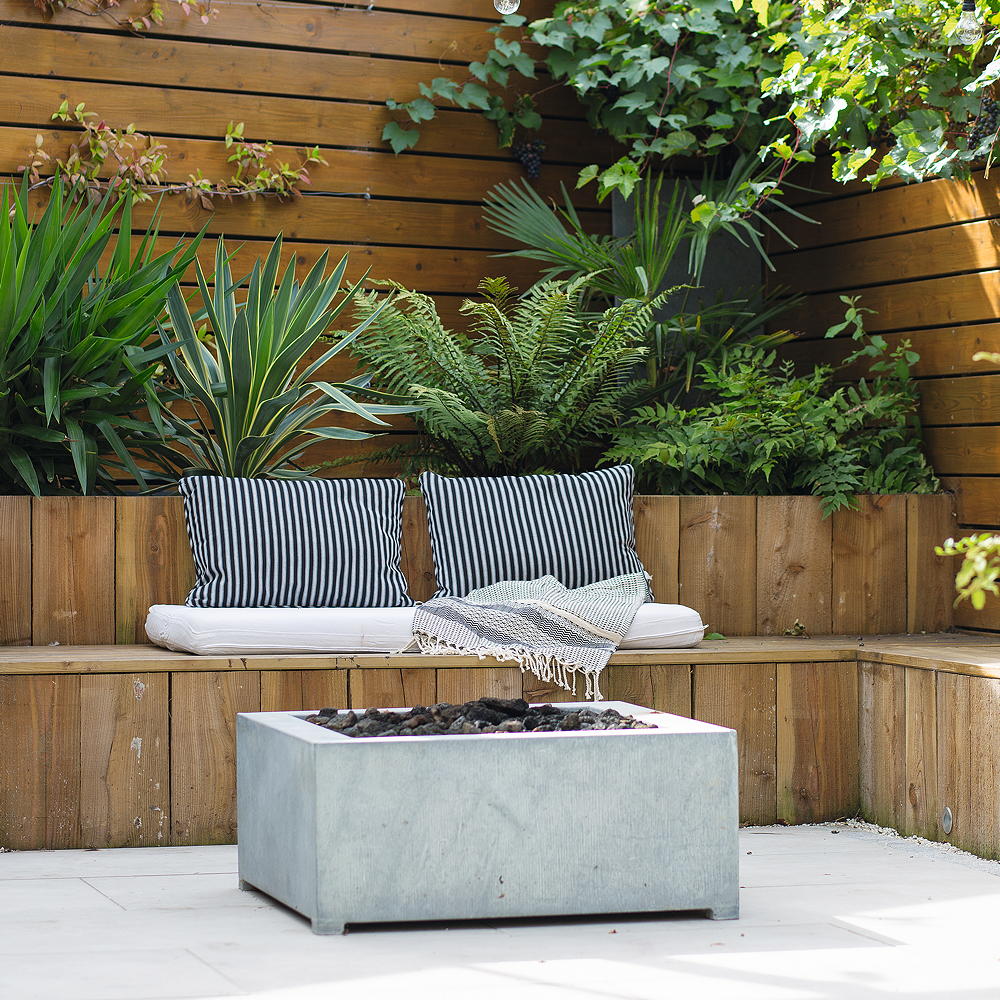
When you’re relaxing in your sensory garden you’ll want to feel comforted and cossetted. Bring in natural fibre or vintage textiles when you’re thinking about dressing your best garden furniture, which should also be as comfortable and organic as possible.
Focusing on natural or reclaimed pieces will help to create an authentic, grounded space. Favour soft, underplayed shades such as pale green, terracotta and delicate mustard rather than dramatic monotones or harsh contrasts.
7. Taste your homegrown herbs
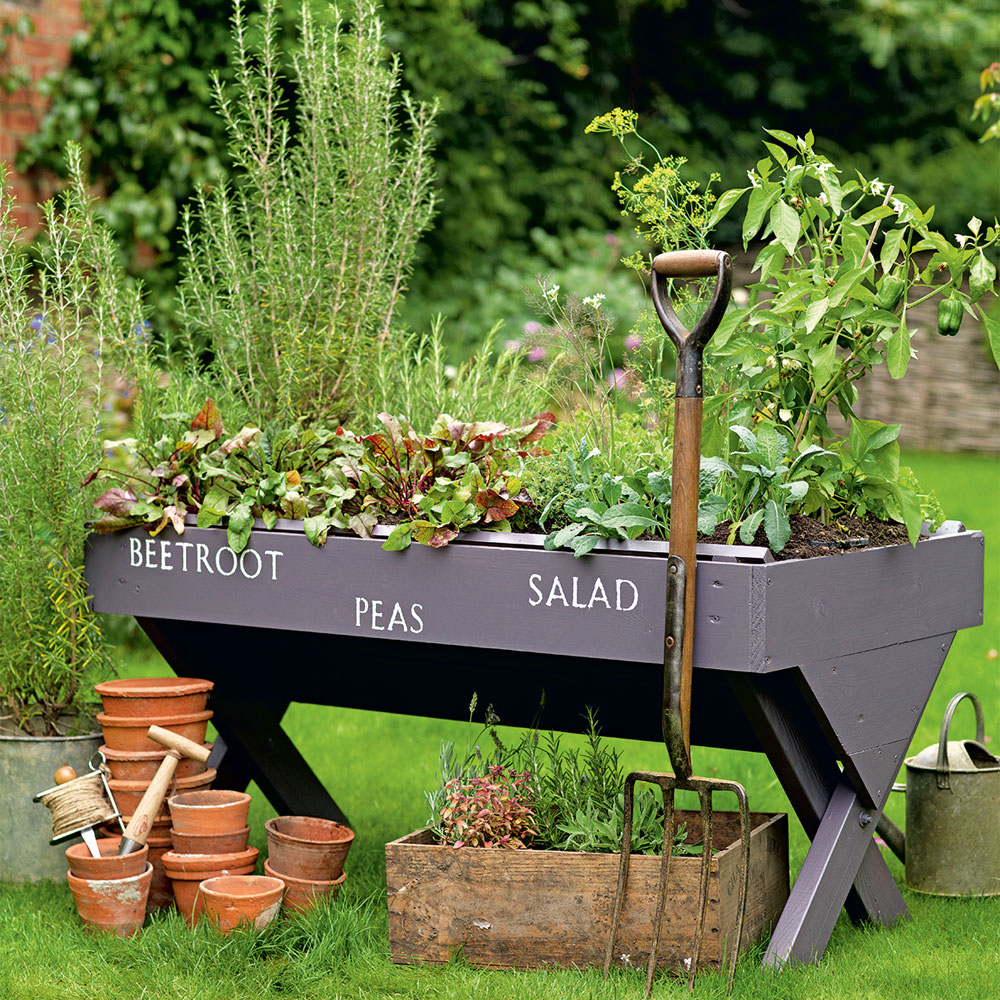
Being able to reach out and pick a handful of fresh homegrown herbs – basil, rosemary, oregano and the curry plant (Helichrysum italicum) all have amazing aromas – is the most simple and cost-effective way to feel a tangible connection with your garden.
You might also like to plant easy-to-raise vegetables and fruits in pots; tomatoes, mini-courgettes and soft fruits such as raspberries and strawberries are all good to grow.
8. Find a place to focus
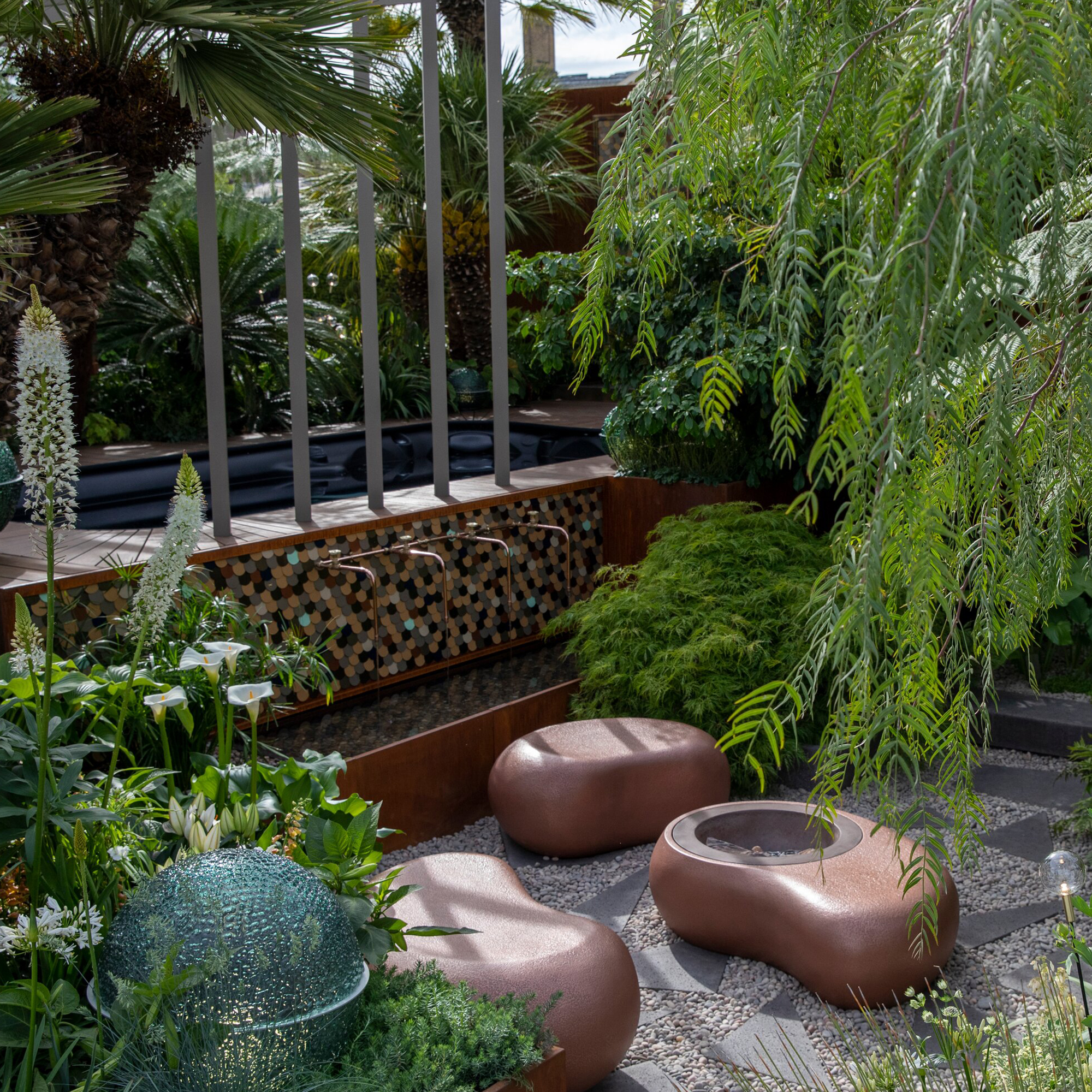
Garden designer Kate Gould’s ‘Out of the Shadows’ Sanctuary garden at RHS Chelsea this year was dedicated to promoting peace, calm and wellbeing. As well as a lush mix of tropical and native planting, it also included a series of garden decking ideas offering lots of inspiration for how we can all devise discrete spaces in our own gardens for contemplation.
She opted to include pebble-shaped seating with a brushed copper finish. However, if you are short on space, why not carve out space for a natural bench or hanging chair in a peaceful corner screened off from the buzz of the rest of the garden.
9. Zone out your space
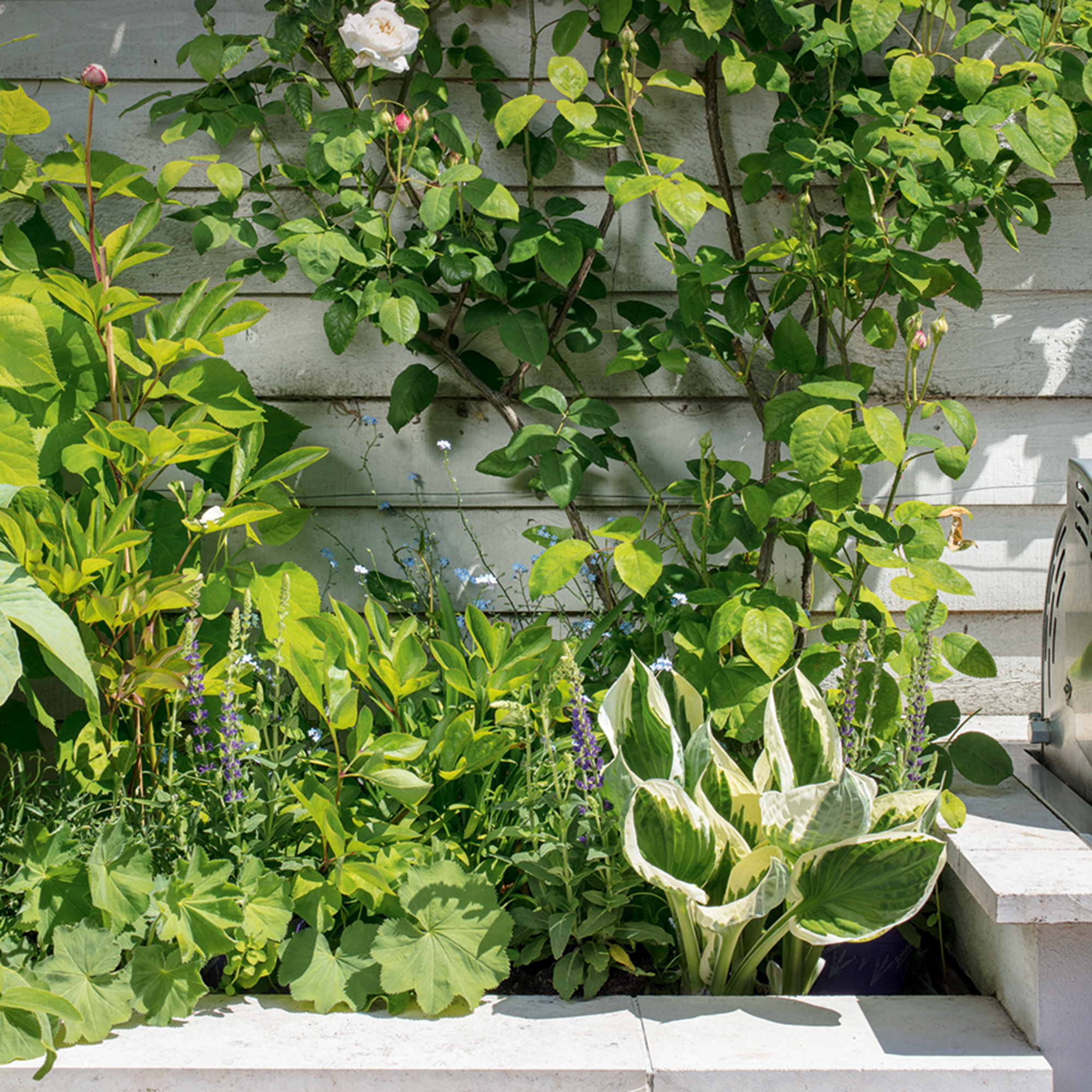
A sensory garden may feel abundant with flowers, scents, light, shade (don’t forget, you will need garden shade ideas to guard against hot sunshine and the odd drop of rain) and relaxing elements, but it should also feel organised.
When considering garden layout ideas for a sensory garden, think about zoning, says garden designer Lee Burkhill. 'Zoning is useful because it helps you to make sense of all the different senses you’re appealing to,' he explains.
'You might have an ‘excitement’ zone in a sunny spot, with flowers in hot, vibrant colours such as oranges and reds, for example. Or a ‘touch zone’ with plants that are evergreen or have glossy or textured leaves.'
10. Build textured surfaces for touch
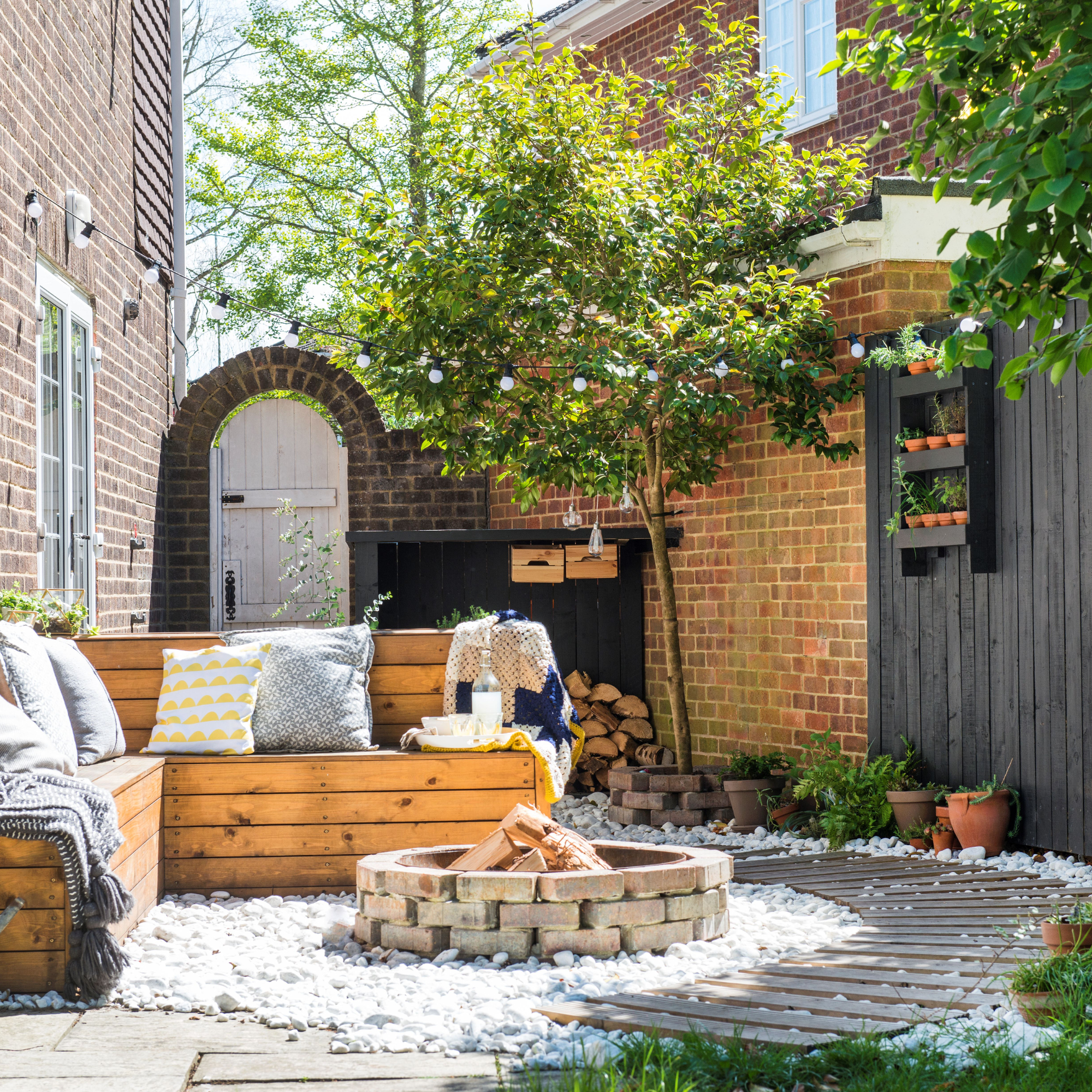
Plants aren’t the only way to introduce a ‘touch zone’ to your garden. There are a number of textured surfaces that you build into your outdoor space. ‘Think about the materials you want to use on pathways to create different textured path surfaces,’ says Stannah’s Gardening Expert and BBC Gardeners’ World presenter, Mark Lane. ‘Gravel will crunch underfoot, exciting the auditory senses while visually contrasting with turf and planting.’
You also want to think about the textures that you will be spending a lot of time on, such as your garden seating. ‘Natural stone will be smooth to walk and sit on, while wooden structures will be warm and can be left smooth or rough,’ Mark continues. In contrast, ‘metal in the sensory gardens will be cooler to the touch, especially in winter.’
11. Add a shelter
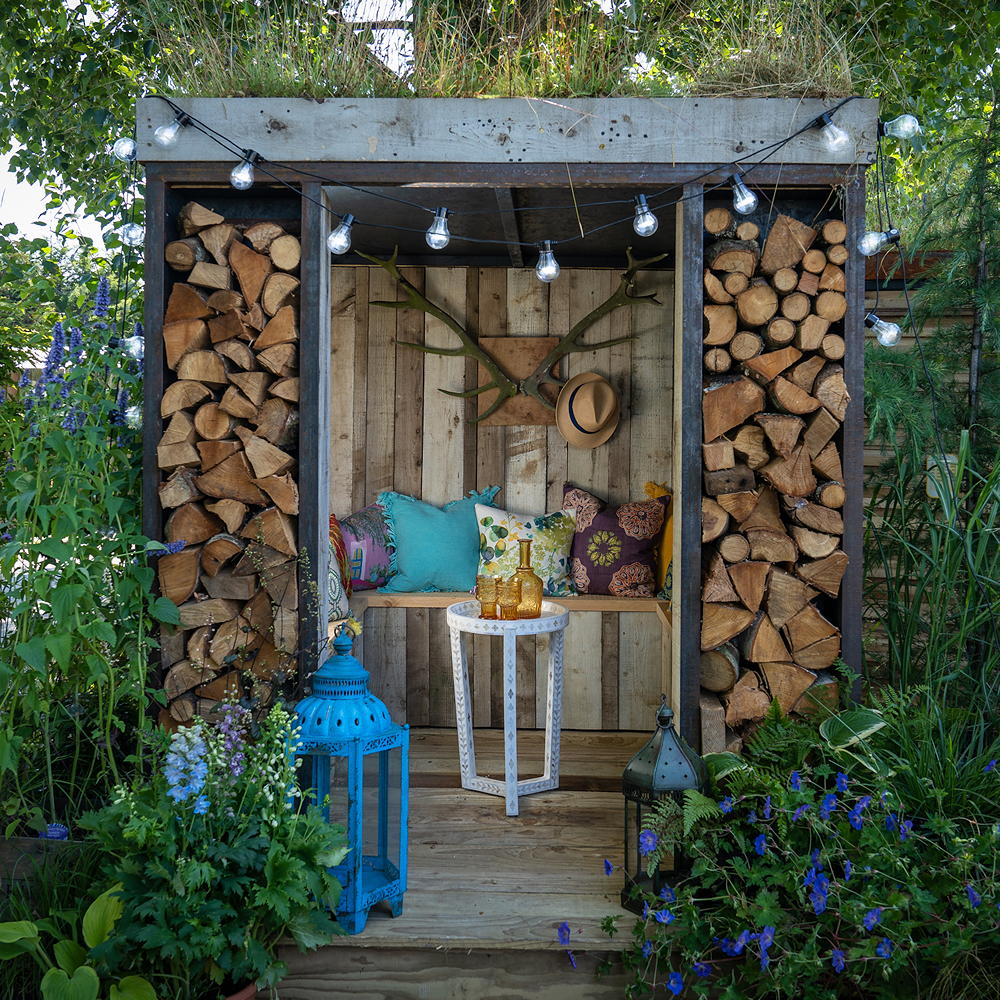
It can be rather frustrating when you can’t enjoy sitting out in your garden because of bad weather but Morris Hankinson, Director of Hopes Grove Nurseries, has a suggestion to help you get the most out of your outdoor space all year round. ‘It might be a nice idea to create a shelter so that you can sit and enjoy your sensory garden in all weather conditions,’ he proposes.
‘It doesn't have to be large, as long as it's got some sort of covering to protect you from the rain. Depending on the material of your shelter, the sound of rain hitting it could add a whole new element to your sensory garden.’
12. Always work with nature
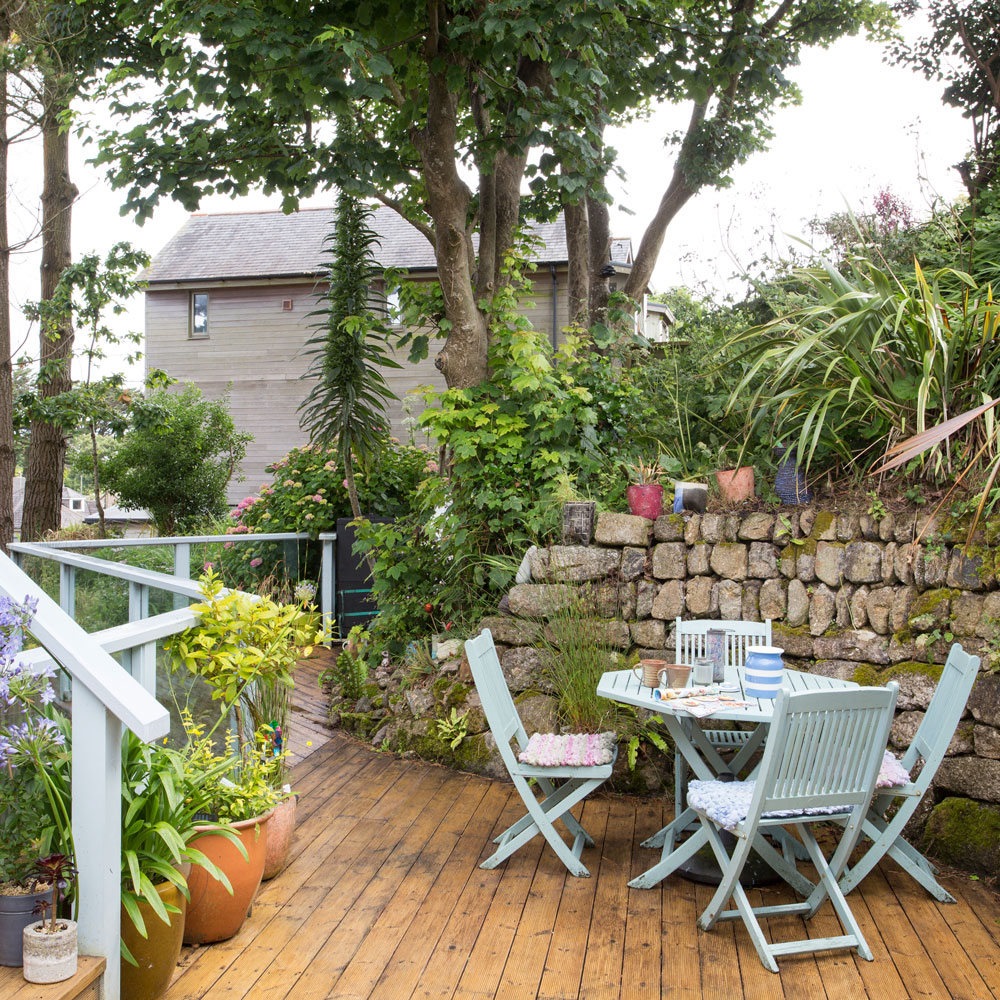
Whether you have an urban backyard or a country plot, it’s highly likely that beyond your own boundary there will be something beyond to provide a natural context for your garden fence ideas.
So when you’re planning your sensory garden, position crucial elements such as water features, seating and contemplation areas to take advantage of attractive trees, shrubs and views in the background. A hammock slung on a stand beneath the shade of a neighbour’s horse chestnut tree, even a row of conifers, can help you feel connected to nature.
13. Look up
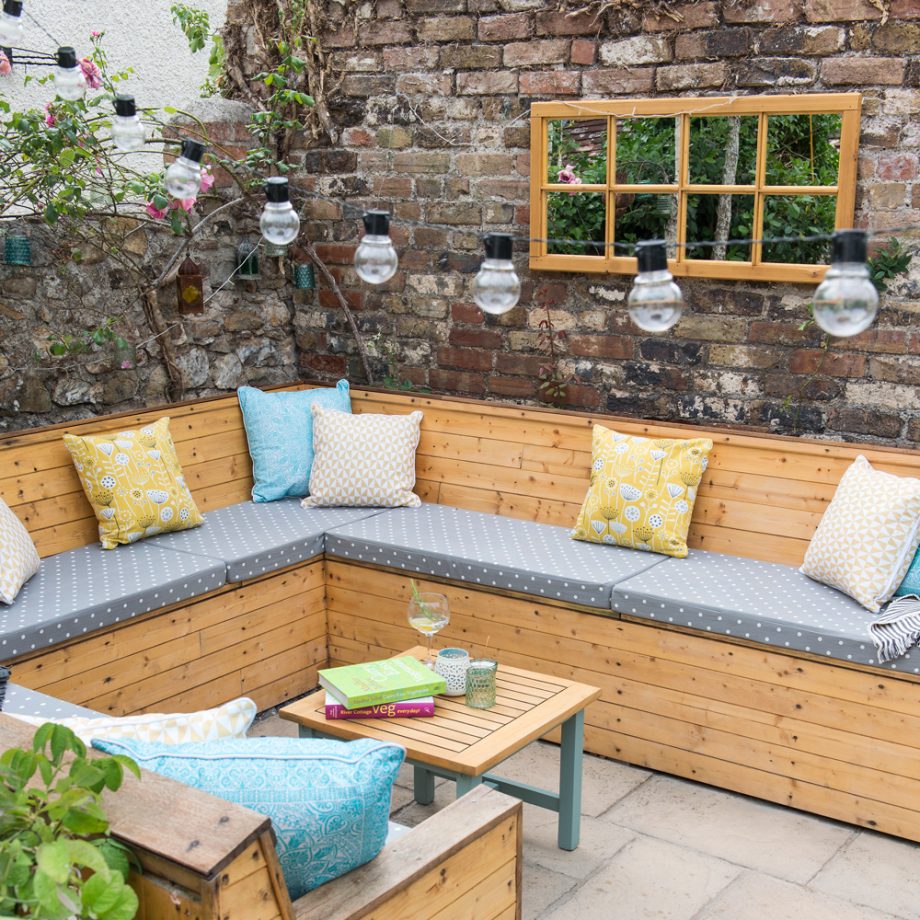
As the sun slips down and twilight begins to fall, the sensory garden can become even more nurturing. Bring in relaxing elements such as soft garden lighting, a canopy, sail or pergola, and look at garden trellis ideas to add scented climbing plants such as jasmine and honeysuckle – scent is always stronger in the evening. For maximum clouds of enveloping perfume, add generous pots of night-scented stock and nicotiana (tobacco flower).
14. Stimulate all the senses
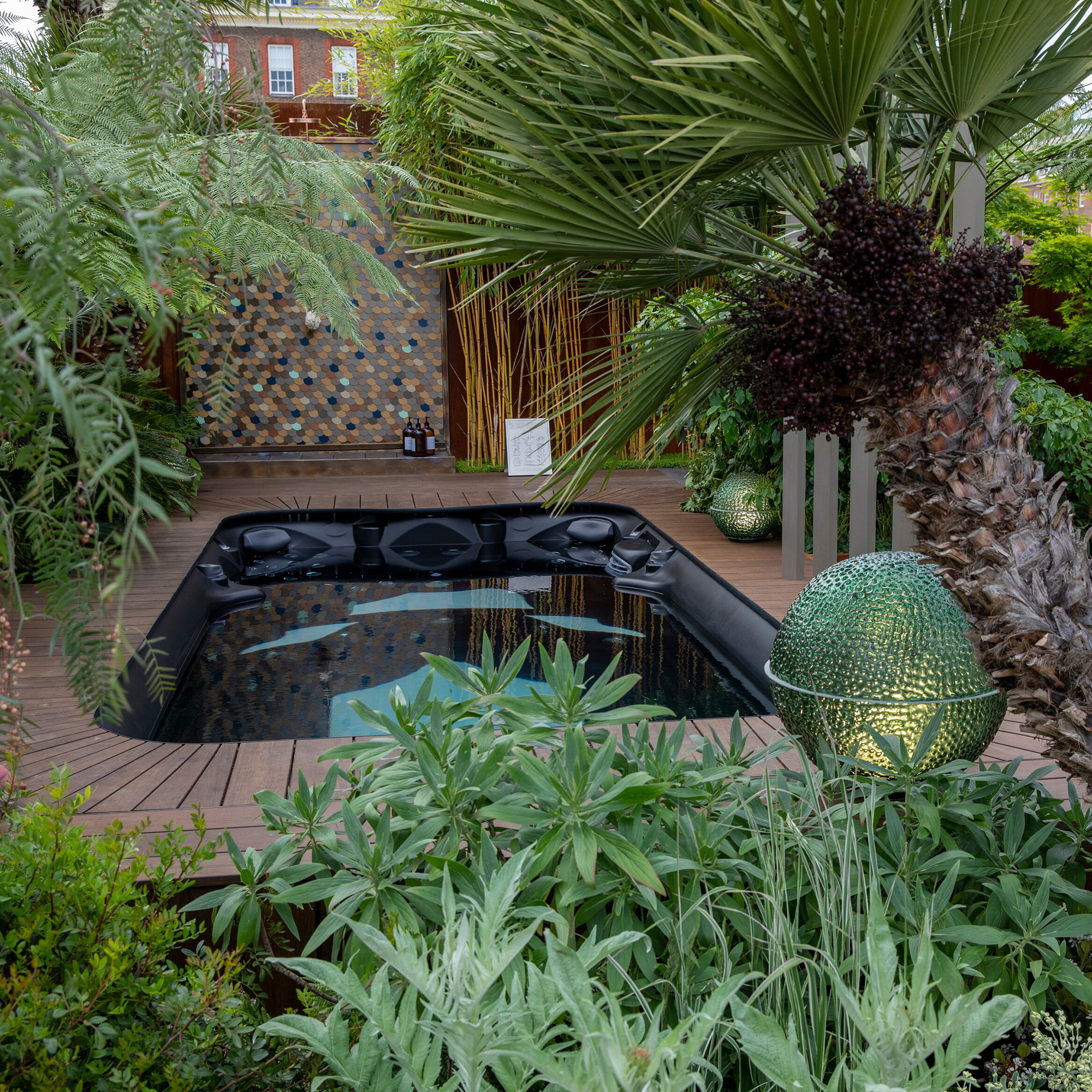
When you’re planning your sensory garden look for easy garden ideas that will help everything hang together. Whilst it’s good to have specific elements dedicated to stimulating and enhancing each sense, consider too the overall palette of the garden. It should, ideally, be calm and soothing.
In Kate Gould’s RHS Chelsea garden, ‘Out of the Shadows’ for example, she worked off a palette of natural deep browns, for the decking around the swim spa and silvery grey for the gravel and paving hard landscaping.
With a larger garden, you might like to take professional advice on this and find out how much does a garden designer cost to bring your vision to life.
15. Create a quiet corner
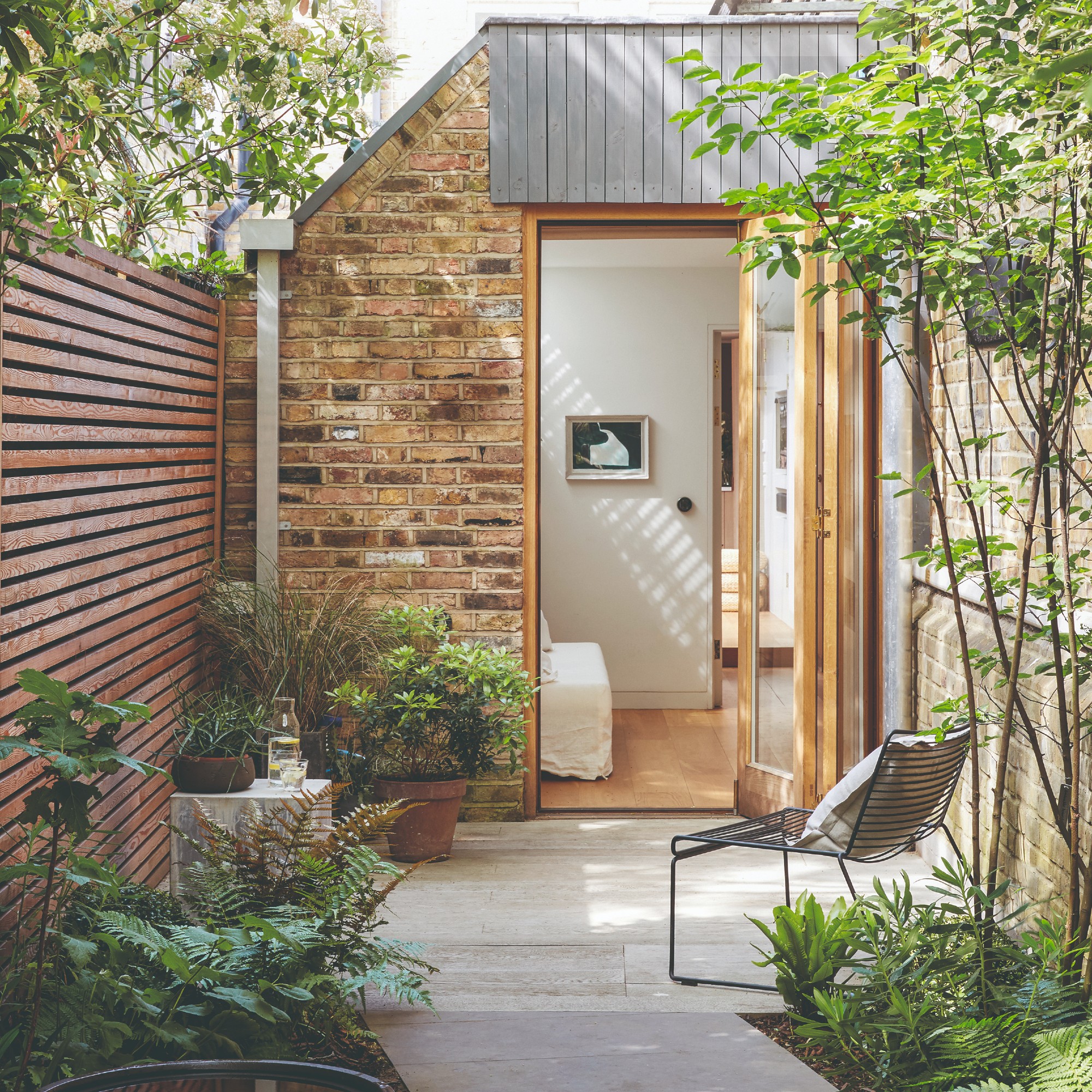
‘Planning a corner which is away from other parts of the garden and which feels like a haven from noise, movement and other people can be a welcome addition,’ Fiona explains. And this is especially true if someone in your family struggles with sensory issues more generally.
‘In my experience, it helps to lay out a designated mindfulness corner with comfortable seating, soft lighting and tranquil views to encourage deeper relaxation and contemplation,’ explains Rudolph Diesel, Interior Designer at Rudolph Diesel London. And ‘to avoid overstimulation, you may also choose to have a 'no-sensory' part of your sensory garden, where there are muted colours, textures, smells, tastes and sounds. This could be a safe space for an autistic person to spend time in when overwhelmed,’ Morris agrees.
16. Consider the seasons
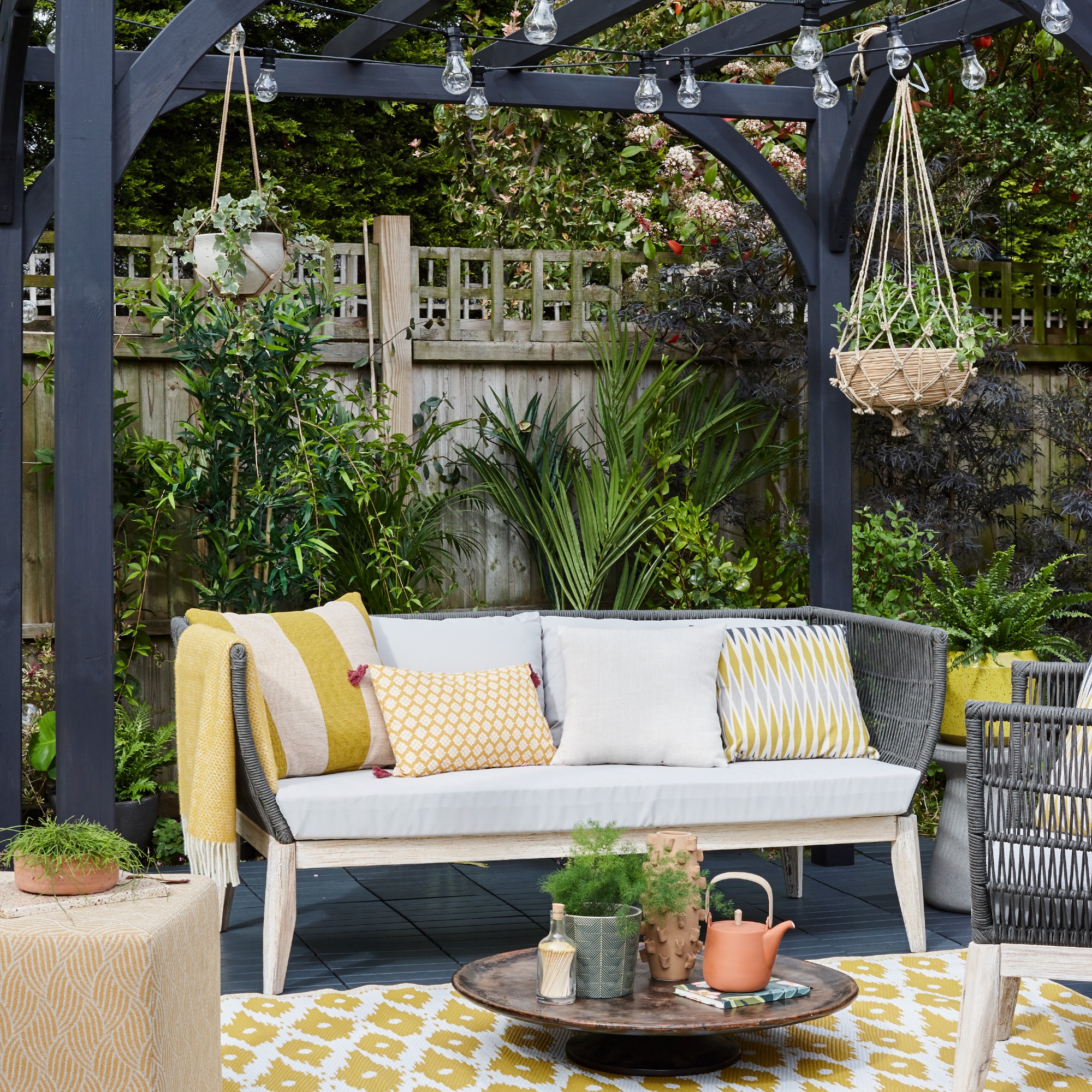
Many of the experts also agree that it’s important to consider each of the seasons to truly get the most out of your sensory garden. While you’ll most likely spend more time outdoors in the summer than you would in the middle of winter, ‘it’s important that your sensory garden is just as effective throughout the autumn and winter seasons,’ Gardenstone’s Director, John Clifford, argues.
‘Plants with vivid autumnal foliage or winter berries can provide colour while grasses offer movement and sound,’ Fiona concurs. While ‘garden ornaments, wind chimes, water features and rockeries are year-round sources of stimulation for the senses.’
17. Install art and sculptures
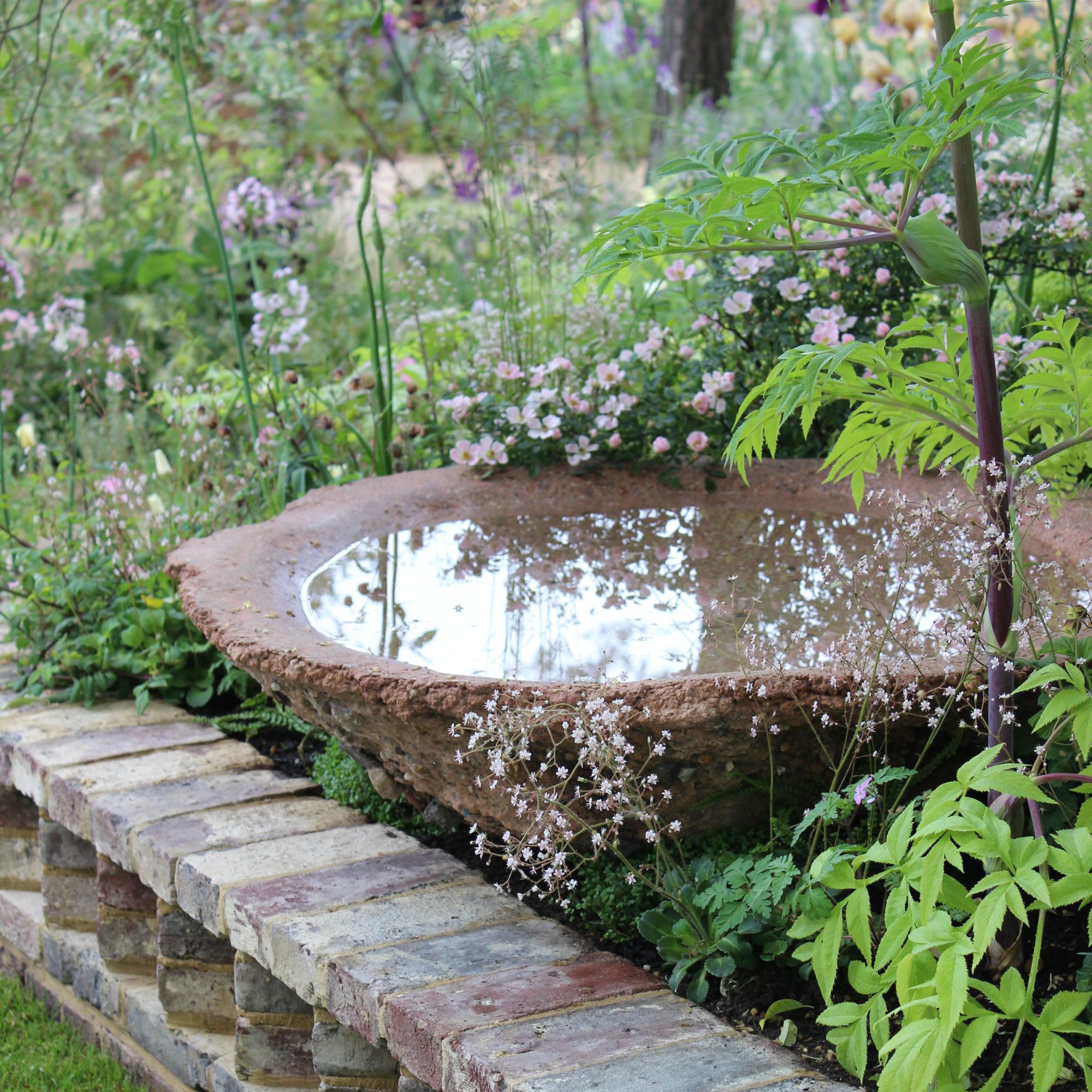
‘Installing tactile sculptures or art displays made from different materials, like wood, metal or stone, can entice guests to truly immerse themselves in the sights and textures of your garden,’ says Rudolph.
Depending on your personal taste, you can add everything from decorative metal panels and hanging bird baths, to various types of ornaments and sculptures.
FAQs
What should a sensory garden include?
'The prime purpose of a sensory garden is to elicit feelings,' says garden designer Kate Gould. 'Ideally you want to create a sense of safety and seclusion since those feelings are the ones that will make you want to linger.'
Most sensory gardens are designed to be as relaxing and healing as possible, with lots of fragrance, gentle sounds and calming vibes, but not all. Some sensory gardens are made especially to stimulate children. These will have interesting play aspects such as mud kitchens and safe ‘mirror ponds’, which are very shallow bowls of water sunk into the ground, or raised ponds on wooden legs, to reflect the sky and nature all around.
Other kinds of sensory gardens are created to support and stimulate older and vulnerable people; these sensory gardens may have generous pots of bright marigolds and striped petunias to appeal to those with limited vision, or raised vegetable beds with easy access for the mobility-impaired.
What do you hear in a sensory garden?
Silence, if that’s the quality you would like most of all. However, most sensory gardens will feature a carefully-chosen auditory element – and often, that is water.
'Water creates both visual and audible appeal and combined with plants that rustle can help create a great atmosphere, especially in towns and cities where it can help baffle out the sounds of close neighbours, car horns and so on,' says Kate Gould. 'Plants and water attract wildlife, so birdsong is another element that adds to a sensory factor in a garden.'
How or why are sensory gardens beneficial?
Sensory gardens can be a great way for us to connect to nature by focusing on our senses. Not only can this be a great thing for our mental health and allowing us to relax and unwind, but it also creates a calm environment which can reduce stress and in turn make us feel happier.
Plus, sensory gardens can be particularly beneficial for a wide range of ages. They are ‘great for sensory development in children, especially those with sensory sensitivities, with the different sounds, scents, textures and smells working to calm them,’ explains Chris Bonnett, Founder of GardeningExpress.
‘They can also provide a safe and joyful space for seniors with Alzheimer’s or dementia. Caring for a sensory garden can be beneficial to their mental and physical wellbeing, encouraging them to get out in the sunshine,’ and fresh air, Chris concludes.

Jayne Dowle is an award-winning freelance gardening, homes and property writer who writes about everything from swimming ponds to skyscraper apartments, for publications including Sunday Times Home, Times Bricks & Mortar, Grand Designs, House Beautiful and The Spectator. Awarded the Garden Journalist of the Year accolade at the Property Press Awards in 2021, she has a degree in English Language and Literature from the University of Oxford and a lifelong love of homes, interiors and gardens.
- Ellis CochraneContributor
